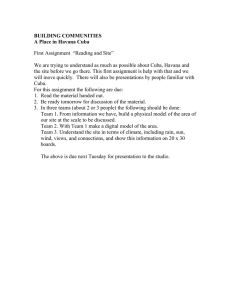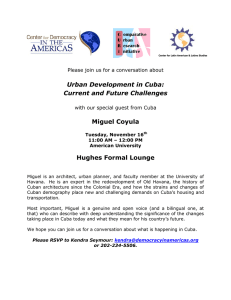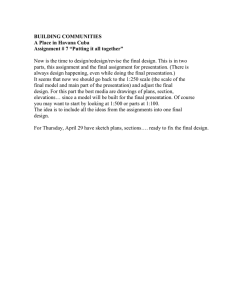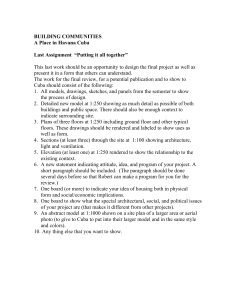CONFERENCE REPORT ‘FOR THE SOCIALLY RESPONSIBLE UNIVERSITY’. REFLECTIONS ON
advertisement
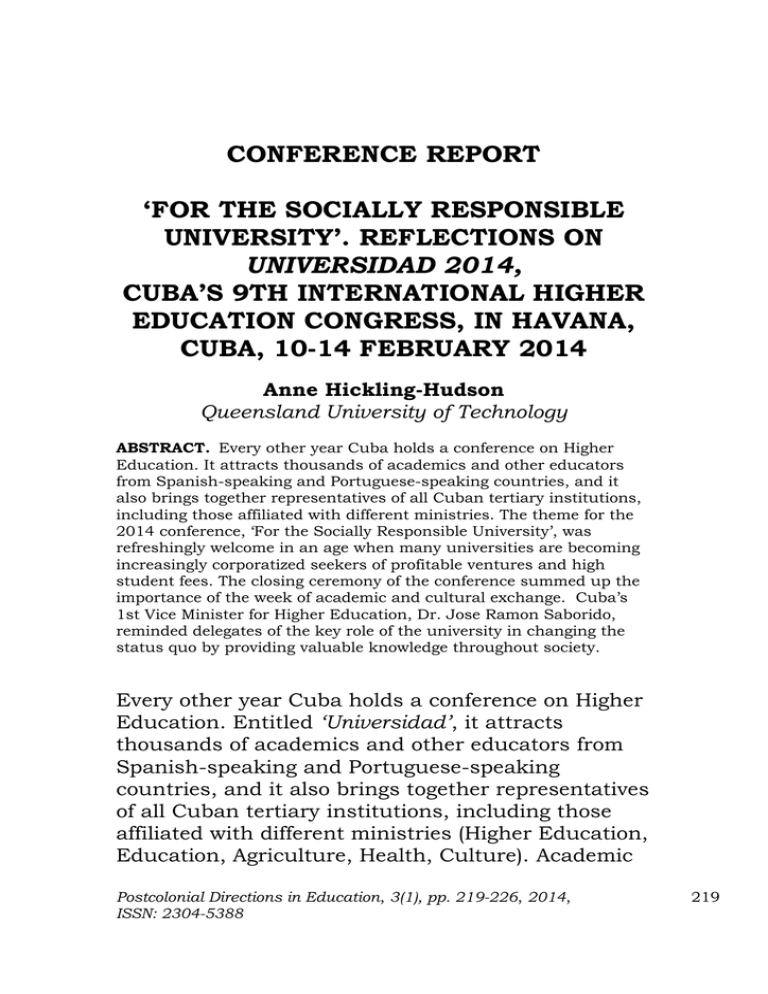
CONFERENCE REPORT ‘FOR THE SOCIALLY RESPONSIBLE UNIVERSITY’. REFLECTIONS ON UNIVERSIDAD 2014, CUBA’S 9TH INTERNATIONAL HIGHER EDUCATION CONGRESS, IN HAVANA, CUBA, 10-14 FEBRUARY 2014 Anne Hickling-Hudson Queensland University of Technology ABSTRACT. Every other year Cuba holds a conference on Higher Education. It attracts thousands of academics and other educators from Spanish-speaking and Portuguese-speaking countries, and it also brings together representatives of all Cuban tertiary institutions, including those affiliated with different ministries. The theme for the 2014 conference, ‘For the Socially Responsible University’, was refreshingly welcome in an age when many universities are becoming increasingly corporatized seekers of profitable ventures and high student fees. The closing ceremony of the conference summed up the importance of the week of academic and cultural exchange. Cuba’s 1st Vice Minister for Higher Education, Dr. Jose Ramon Saborido, reminded delegates of the key role of the university in changing the status quo by providing valuable knowledge throughout society. Every other year Cuba holds a conference on Higher Education. Entitled ‘Universidad’, it attracts thousands of academics and other educators from Spanish-speaking and Portuguese-speaking countries, and it also brings together representatives of all Cuban tertiary institutions, including those affiliated with different ministries (Higher Education, Education, Agriculture, Health, Culture). Academic Postcolonial Directions in Education, 3(1), pp. 219-226, 2014, ISSN: 2304-5388 219 content is in the form of panels, workshops, posters debates and invited keynote lectures. The conference also provides a “trade show” with informational booths and displays. It offers bus tours and guided visits to a variety of universities, colleges and research centres, and excellent opportunities for informal and spontaneous contacts between educators. This conference occurs in alternate years with the conference ‘Pedagogía’ 1, another large gathering of thousands of educators. Together, they constitute an important contribution made by Cuba to promoting research and collaboration between educators at all levels from Cuba and the Latin American and Caribbean regions, as well as from other countries of the world. This year, I was fortunate to be able to attend and participate in Cuba’s 9th international conference on Higher Education, ‘Universidad 2014’. It was held at the large Convention Centre (Palace of Conventions) in Havana, and according to the report at the close of the conference, attracted 3,815 participants. They included some 800 Cubans, and 3000 foreign delegates from 58 countries and 11 international organisations. 2500 papers were presented. The majority of the delegates were from Latin American countries, with a minority from English-speaking countries, including delegates from three of the island campuses of the University of the West Indies (Jamaica, Trinidad and Barbados). Naturally most of the papers were in Spanish, but translation was excellently organised, The Pedagogía conference is described by Emerita Professor Lidia Turner Marti in Chapter 18 of my book The Capacity to Share: A Study of Cuba’s International Cooperation in Educational Development, (2012), editors Anne Hickling-Hudson, Jorge Corona González and Rosemary Preston, published by Palgrave Macmillan, New York. 1 Postcolonial Directions in Education, 3(1), pp. 219-226, 2014, ISSN: 2304-5388 220 with three large lecture halls featuring international panels of speakers whose papers were simultaneously translated into a range of languages including Spanish, English, French, and Portuguese. The conference theme ‘For the Socially Responsible University’ was refreshingly welcome in an age when many universities are becoming increasingly corporatized and commercialized seekers of profitable ventures and high student fees. The letter of welcome from the Cuban Minister of Higher Education, published in the conference program, set out the rationale of the conference: to ‘debate on the capacity the university has to take on… leadership in matters of knowledge creation, promotion and diffusion. The university is the orienting institution par excellence of governments in the quest for solutions to inequality and exclusion. Only by achieving that purpose we will reach higher levels of education that will ultimately propitiate the training of conscious citizens, always committed to the search for the welfare and progress of their peoples’. Congress participants presented papers and debated them in 18 rooms in the convention centre, ranging from small meeting rooms to large lecture halls, one of these seating up to a thousand people. Some delegates presented papers by special arrangement at Cuban universities, whose academics and students were thereby involved in the congress, including at The University of Havana and The University of Informatic Sciences (UCI). For me, an interesting visit, organized by my colleague Dr. Emigdio Rodríguez Alfonso, was to the Enrique José Varona University of Pedagogical Sciences in Havana, where I gave an invited seminar on Postcolonial Directions in Education, 3(1), pp. 219-226, 2014, ISSN: 2304-5388 221 comparative education research methods to the class of about thirty Master of Education students and four of their professors in a new M.Ed. program of Comparative and International Education. A list of some of the topics debated during the University 2014 congress included: - Collaboration between universities of Latin America and the Caribbean - Multilingualism and multilingual pedagogies - The transfer of knowledge to achieve sustainable development - The role of university knowledge in the protection of the environment - Humanism and education - Culture and politics - Social movements and the university - Systems of development and management with equity - The training of professors in the effective use of ICTs, including the analysis of approaches to online programming - Gender, Science & Higher Education – development issues - University programs of Adult Education - Financing of higher education - Problems of pedagogy and didactics - The management of knowledge Daily optional bus tours were organised to 33 research and educational centres. Full participation in these tours illustrated the level of interest from delegates in visiting institutions of Cuba’s innovative and thriving education system. The tours provided visitors with an introduction to Cuba’s extensive Postcolonial Directions in Education, 3(1), pp. 219-226, 2014, ISSN: 2304-5388 222 higher education sector, including universities specializing in Medical Sciences, Agriculture, Engineering, Pedagogical Sciences, and Sports and Physical Education. Other tours went to research institutes such as the Centres for Genetic Engineering and Biotechnology, for Molecular Immunology, for National Scientific Research, and for Design. Still other tours took visitors to primary and secondary schools and Early Childhood and Adult Education centres. During my years of researching Cuba’s university system (as an academic at the Queensland University of Technology in Australia) I had already visited several types of Cuban university. On this conference visit, I chose the tour of the beautiful campus of Cuba’s University of the Visual and Performing Arts (ISA), as I had long been interested in Cuban achievements in many artistic fields. The tour bus was full and I was too late to get on it. So a student helper at the conference hailed me one of those famous old taxis, a US Chevrolet from the 1950s. The driver delivered me there and waited with me until someone at the gate of the campus directed me as to how to catch up with the rest of the tour. I spent a fascinating morning with the group of visitors watching the training and practice of students in ceramic and sculpture studies, folkloric dance, visual arts and music – classical and jazz. Themes that stood out for me in the sessions of the conference I attended (where translations into English were available) were those discussing the progress of the higher education sector in various countries, and how universities could tackle the challenges of collaboration and the sharing of knowledge. Scholars debated how academics could Postcolonial Directions in Education, 3(1), pp. 219-226, 2014, ISSN: 2304-5388 223 increase their efforts to provide university education that advanced the common good and sustainable development. My paper on ‘Cuba’s Internationalism in Education’ contributed to this focus, as it analysed the global significance of Cuba’s role in sharing its university education system through having provided, over the life of the Revolution, scores of thousands of university and polytechnic scholarships for international students from impoverished backgrounds, as well as academic and administrative consultation and exchange that had brought improvements to higher education in several collaborating countries 2. A panel of great interest to many participants was entitled “Hugo Chavez and his social commitment”, in which the ideas and activism of the late Hugo Chavez were honoured by ministers from Venezuela and Cuba involved in the collaboration between the two countries. The panelists and audience talked about his work to support the people in Venezuela. This was of particular significance given the deep problems of university sectors in Latin American countries discussed in some of the papers I attended. For example, the paper given by Professor Norberto Fernández Lamarra of Argentina 3 observed that the growth of private universities in Latin America was four times that of public universities, that many of the universities were isolated, not responding My conference paper was informed by the research set out in The Capacity to Share: A Study of Cuba’s International Cooperation in Educational Development, (2012), editors Anne Hickling-Hudson, Jorge Corona González and Rosemary Preston, published by Palgrave Macmillan, New York. 3 Professor Norberto Fernández Lamarra is Director, Postgraduate Education, NIFEDE (Universidad Nacional de Tres de Febrero). He specializes in Higher Education and Planning, is the author of many books, and is President of the Argentinian Society of Comparative and International Education as well as Deputy President of the World Council of Comparative Education Societies (WCCES). 2 Postcolonial Directions in Education, 3(1), pp. 219-226, 2014, ISSN: 2304-5388 224 adequately to the challenges of their societies, that in some cases academic management models were old and outdated, and that often higher education was continuing to increase the divisions and elitism of the societies, with many students having to go to universities of very poor quality. As was argued by the Cuban authors of another paper I attended 4, the socioeconomic challenges facing countries in the 21st century demand a stronger university role in striving for more just and inclusive societies. They put the case that Latin America and the Caribbean need urgent efforts from universities to produce graduates who can contribute to reducing the concentration of wealth, achieving more equitable distribution and eradicating poverty. They argued that this would characterise a more effective social, political and economic role for education. This was a stance that I heard put forward in several papers at the conference, and I reflected on the difference between this and the competitive commercial messages (including those in flyers and TV advertisements) from universities in many other countries, where students are invited to study because of the individual benefits and social status that enrolment at particular universities may bring them. The closing ceremony of the conference summed up the importance of the week of academic and cultural exchange, with speeches by UNESCO’s Deputy Director General for Education, Mr. Ojan From a conference Round Table paper entitled “Visión prospectiva de la educación superior en América Latina y el Caribe y su aporte al desarrollo humano”, translated as: “ Reflections on the role of higher education in Latin America and the Caribbean in supporting social development”, by Professor Elvira Martin Sabina of the University of Havana, and Jorge González Corona of the Association of Cuban Educators, Comparative Education Section. 4 Postcolonial Directions in Education, 3(1), pp. 219-226, 2014, ISSN: 2304-5388 225 Tang, the 1st Deputy President of Cuba, Miguel Diaz Canel, and Cuba’s 1st Vice Minister for Higher Education, Dr. José Ramon Saborido. The latter reminded delegates that changing the status quo depends on the acquisition of valuable knowledge throughout society, and that universities have to play a fundamental part in training people for their social roles. He went on to describe universities as protagonists generating changes so that the society can find a better future. They are institutions that influence the course of thinking about how we can obtain sustainable human development. Their applied role guides people in developing innovation and training in the field, and in tackling solutions to social and economic problems. Fundamental to the role of the university is the construction of societies based on the meeting of social needs, and this should feed directly into national and international interests. University education should stimulate solidarity and the wish of peoples to advance to a more just society and just world. “We are convinced”, he ended, “that this Congress has strengthened the relations between the many universities whose delegates attended, as well as the links between many countries.” I left Havana appreciating the role of the Congress in forging links that had the possibility of helping universities to collaborate in developing the talents, intelligence, creativity and solidarity of all their stakeholders to tackle the global problems that face us. Postcolonial Directions in Education, 3(1), pp. 219-226, 2014, ISSN: 2304-5388 226
